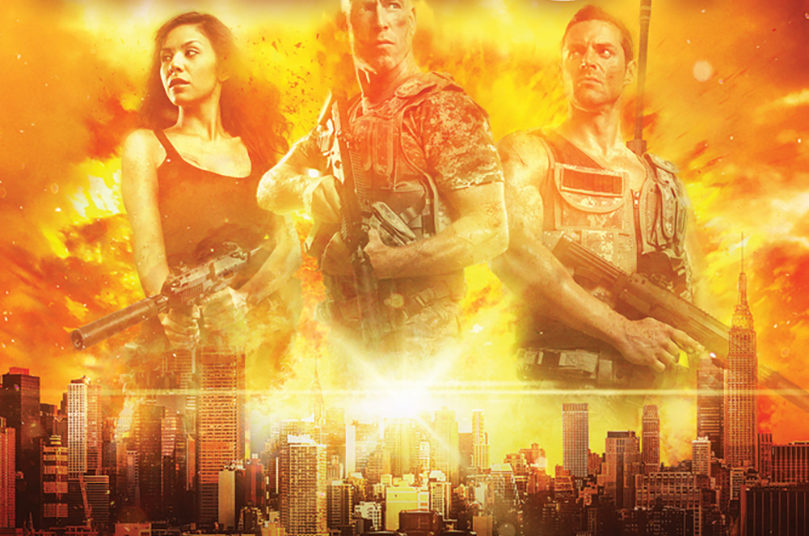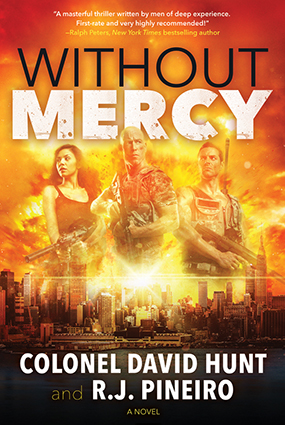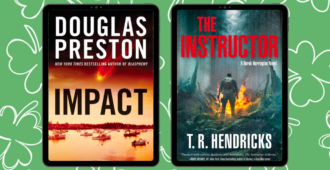opens in a new window opens in a new window
opens in a new window opens in a new window
opens in a new window opens in a new window
opens in a new window opens in a new window
opens in a new window opens in a new window
opens in a new window
When ISIS detonates nuclear weapons in two key American strongholds, the United States plunges into chaos and the CIA scrambles to prevent a third tragedy in Without Mercy, a terrifying and topical thriller from Colonel David Hunt and R.J. Pineiro.
The unthinkable has happened: ISIS, covertly assisted by Pakistan’s intelligence services, has acquired nuclear weapons and the ability to deliver them anywhere in the world. They begin with an attack at Bagram Airfield, America’s largest military base in Afghanistan. A second weapon is detonated in Battery Park in New York City.
The blast levels a square mile of Manhattan, including the Financial District. Hundreds of thousands perish. The American economy is in chaos. Banks close their doors. The U.S. supply chain is disrupted. Riots and looting break out while enemies in the Middle East burn U.S. flags in celebration.
The stakes skyrocket when Islamabad CIA Station Chief Bill Gorman unearths evidence of a third bomb headed our way. Across two continents the chase is on to find the runaway terrorists led by the ruthless and capable Salma Bahmani, star agent of Pakistan’s Inter-Services Intelligence, the dread ISI. She will stop at nothing to deliver what could be the final nail in America’s coffin.
Without Mercy will become available March 7th. Please enjoy this excerpt.
1
Vaccaro
WASHINGTON, D.C.
“How did we let this happen? And what are we going to do about it?”
They were simple questions that the newly elected president tossed down the thirty feet of conference table in the Situation Room to guide the outcome of this emergency meeting.
Every black leather chair was occupied this early morning. Each faced a thirteen-inch mobile computer, a sparkling crystal water glass, a white coffee cup adorned with the White House seal, and one very pissed-off commander in chief.
Wearing a dark blue skirt suit, President Laura Vaccaro rested her palms on the table and looked around the room. She weighed 120 pounds, with a slim frame. Short dark hair framed her narrow face, partially covering a fine scar traversing her left temple and cheekbone, earned a lifetime ago in Afghanistan.
Those physically present included the secretary of defense, the secretary of state, and the directors of the FBI, the DIA, and the National Intelligence Program. The White House chief of staff, John Wright, sat to Vaccaro’s immediate right, next to National Security Advisor Lisa Jacobson, the vice president, the secretary of homeland security, and the head of the National Nuclear Security Administration. They formed a mixed group of men and women of varying ages. Some she had brought along, like John Wright and Lisa Jacobson. Others she had retained from the prior administration, like the secretary of defense and the heads of the FBI and the CIA.
For now, she thought. Let’s see how they handle this mess.
The Pentagon feed on the large screen at the end of the room showed all seven members of the Joint Chiefs of Staff. They sat stoically shoulder to shoulder along one side of a black table facing the camera. The chairman and the vice chairman occupied the middle seats, flanked by the chiefs of the army, naval operations, air force, and the National Guard Bureau, and the commandant of the Marine Corps. They formed a unified wall of chiseled faces, starched uniforms, ribbons, and shiny medals.
A pair of sixty-inch TVs on each side wall depicted images of Bagram from various feeds, including the Department of Defense, the National Reconnaissance Office, and two networks.
Even with the sound muted, the videos were hard to watch. Body bags lined the floor of a hangar. Hundreds of wounded overwhelmed the base’s hospital. Rubble and debris reigned across the airfield. Fires raged on the tarmac from countless wrecked planes and helicopters. Soldiers in hazmat suits guarded the gap created by the blast while others began the cleanup process. Meanwhile, demonstrators were out in numbers across the Middle East, dancing and chanting in the streets. In northern Iraq, black-clad militants hung out of cars and trucks waving their AK-47s while parading down the streets of some village. In Tehran, hundreds of American flags were being burned in celebration of the attack.
Vaccaro contemplated the Stars and Stripes in the corner of the room under a single spotlight before calmly looking over at her chief of staff. “Go ahead, John.”
Wright was a former U.S. Marine captain who’d served three tours in Afghanistan before working the Pentagon and then Capitol Hill as a military liaison. He was slim but firm, with penetrating hazel eyes and a full head of blond hair, trimmed very short. He wore a tight gray suit and spit-shine black shoes. Everything about the man was shipshape, from the way he’d led his teams back in the day to his golf game, and especially the manner in which he ran the new White House administration.
Perching a pair of reading glasses on the tip of his aquiline nose, he looked at his computer screen and said, “We will start with a fifteen-minute brief from the DoD, followed by another fifteen minutes from the NNSA, since this clearly deals with nuclear proliferation. Then ten-minute briefs from the counterterrorism divisions of the DIA, the CIA, the FBI, Homeland, and the NSA. An open discussion will follow for exactly one hour. Our goal this morning, ladies and gentlemen, is to formulate a clear plan of action by eleven hundred in response to that.” He pointed at the TV screens. Then he added, “That will leave exactly two hours to prep for the presidential address scheduled for thirteen hundred hours.”
Producing a digital chronometer, Wright looked over at Charles Grandville, the secretary of defense, and started the timer.
Shipshape.
Grandville leaned forward to start his brief, but the president spoke first.
“How many people work inside the Pentagon, Mister Secretary?”
The man blinked, considered the question, and finally said, “Over thirty thousand, Madam President.”
“Specifically, there are thirty-six thousand three hundred and twenty-seven in that building.”
General Grandville, a heavyset man who cut his teeth in the Baltics before fighting in both Gulf Wars and then Afghanistan, obviously didn’t know how to respond to that. So Vaccaro decided to assist him. “Considering all that brainpower, I am looking forward to understanding the facts and our immediate and violent reaction to what I’m seeing on these very large HD screens.”
This was combat. She had been in combat, led men and women into battle in some of the worst armpits of the world. She had killed and had witnessed close friends getting killed or wounded.
She had the damn T-shirt.
And the fucking scars to go along with it.
Vaccaro had risen to popularity after logging more than seven hundred combat flying hours in the A-10 Warthog, the armor-plated aerial “tank” built to fly low and protect the backs of ground soldiers. She became one of the first authorized female combat pilots in 1993, when then-Defense Secretary Les Aspin approved it. And she went on to serve, first in Iraq and later in Afghanistan. During her final tour, she’d refused to leave several ambushed marines, even after taking heavy fire and losing an engine. She’d pushed her wounded A-10 to keep the Taliban at bay until the marines were rescued, but got shot down in the process. Vaccaro spent two days fighting her way to an extraction point, getting shot in the face and stabbed twice. All of the marines she had protected were aboard the two Black Hawk helicopters as volunteers for the daring rescue mission. They had provided the required muscle to reach Vaccaro’s hideout in a nearby cave. One of the marines had ignored the cross fire, raced across the clearing, found her in the cave, and hauled her back to the chopper.
His name was Captain John Wright.
Vaccaro returned a decorated hero to her family in Colorado Springs, where a grateful state sent her to Capitol Hill to represent them in the U.S. Senate.
And within a decade, she was propelled to the Oval Office, where everything she said or did was scrutinized under the twenty-twenty lens of hindsight. This was only her third month in office, and the honeymoon was certainly over.
Wright waved his chronometer at Grandville and said, “Tick tock, Mister Secretary.”
Grandville leaned forward again, and again Vaccaro cut him off. Something on the flat screens had caught her attention.
Stretching an index finger toward the closest LED monitor, she said, “Volume, John.”
All turned to the video playing on every TV feed.
A tall and thin man with a prominent hooked nose and a closely trimmed beard filled the screen. He wore all-black, traditional clothes. In a very calm British accent he began to describe what next came into view in vivid color: nuclear explosions from our past, experiments in the Nevada desert, at Bikini Atoll, and views of Hiroshima and Nagasaki.
All had seen them before in various movies and History Channel segments. The voice then described what had just happened in Afghanistan. The video transitioned from historical footage to the city of Bagram, zooming in on the base during the final seconds before the detonation. The actual blast was shown in high resolution and in slow motion. The fireball engulfed the far end of the base, incinerating soldiers, equipment, and structures. The ensuing pressure wave vaporized a large section of the eastern wall and part of the airfield, tossing massive C-5 Galaxy transports around like toys.
“We wanted no doubts, no illusions, no questions of what has happened and by whom,” said the man as the images of Bagram dissolved and the video transitioned to his upper body. “We, the Islamic State, have nuclear weapons. We have the ability to deliver them anywhere in the world. We have followers where we want them. These followers are your neighbors, your babysitters, your bosses, your police officers—everyone and anyone you know and just as importantly those you do not know, but will very soon.
“We demand the release of all prisoners from your black sites, including Guantanamo Bay and the Parwan Detention Facility. In addition, we demand the withdrawal of every United States soldier from the Middle East. Go home. Now. This isn’t your land. You have no business being here.”
The man paused as the camera closed in on his face.
“These demands will be met within seven days. Your God claims to have built this world in those few days; surely our demands are much easier. However, should our demands not be met in the seven days, the next attack will be on real American soil … not the soil you stole from the Afghan people.”
While his voice trailed off, the images that replaced his face reminded Vaccaro of a big-budget Hollywood production. Most in the room did not realize how well done the message was until later, when the shock abated and realization set in.
What everyone in the room knew, beginning with President Vaccaro, was that the four horsemen of the apocalypse had just galloped their steeds into the White House Situation Room and let them crap all over its blue carpet.
Copyright © 2017 by David Hunt and R. J. Pineiro
Order Your Copy
opens in a new window opens in a new window
opens in a new window opens in a new window
opens in a new window opens in a new window
opens in a new window opens in a new window
opens in a new window opens in a new window
opens in a new window








Will definitely pick up copy, sounds like a great story.